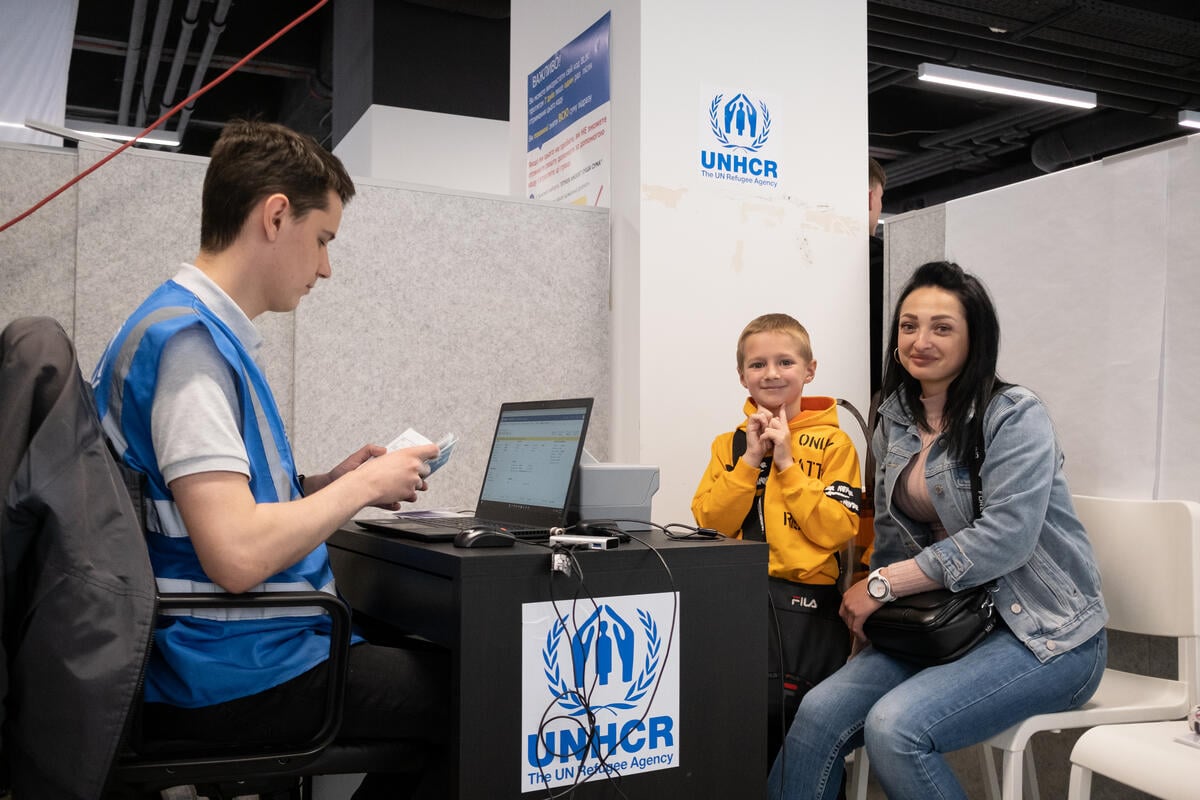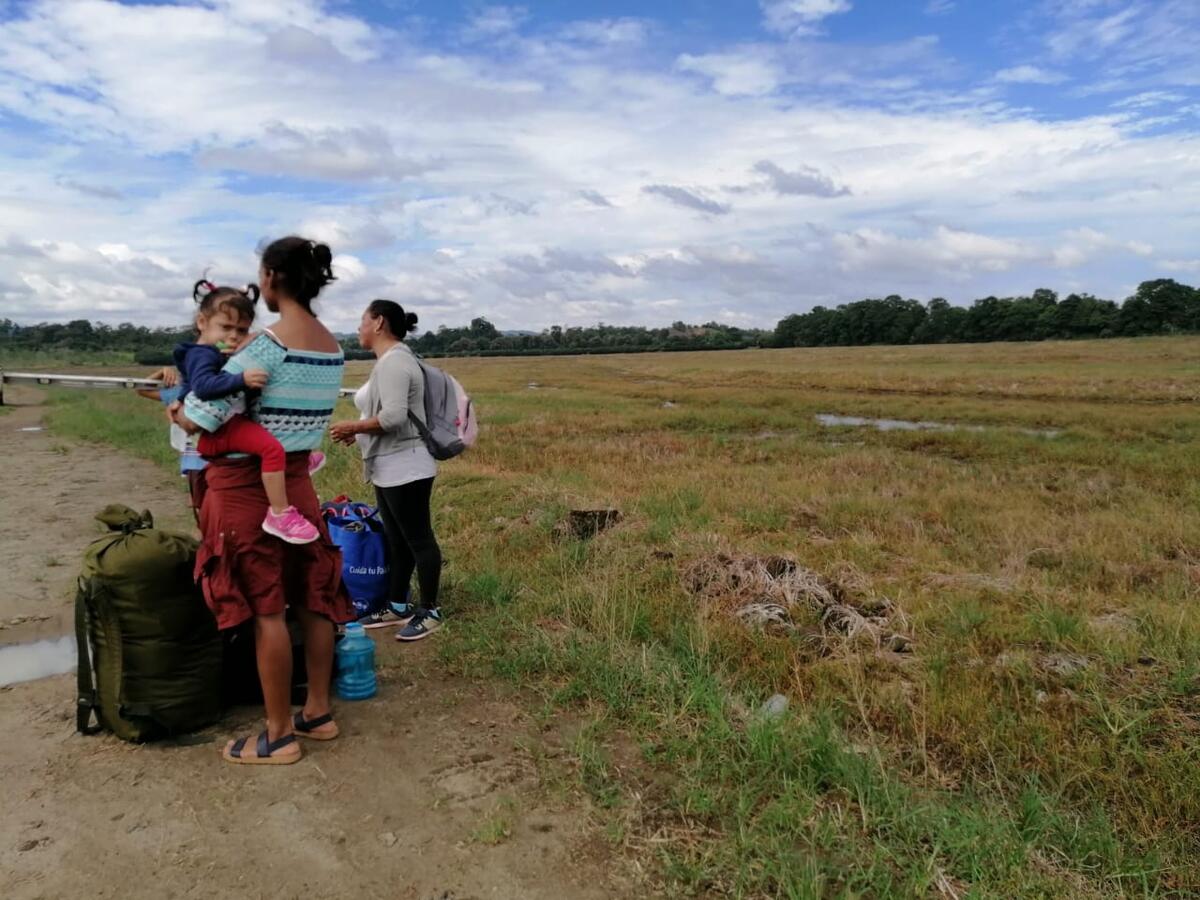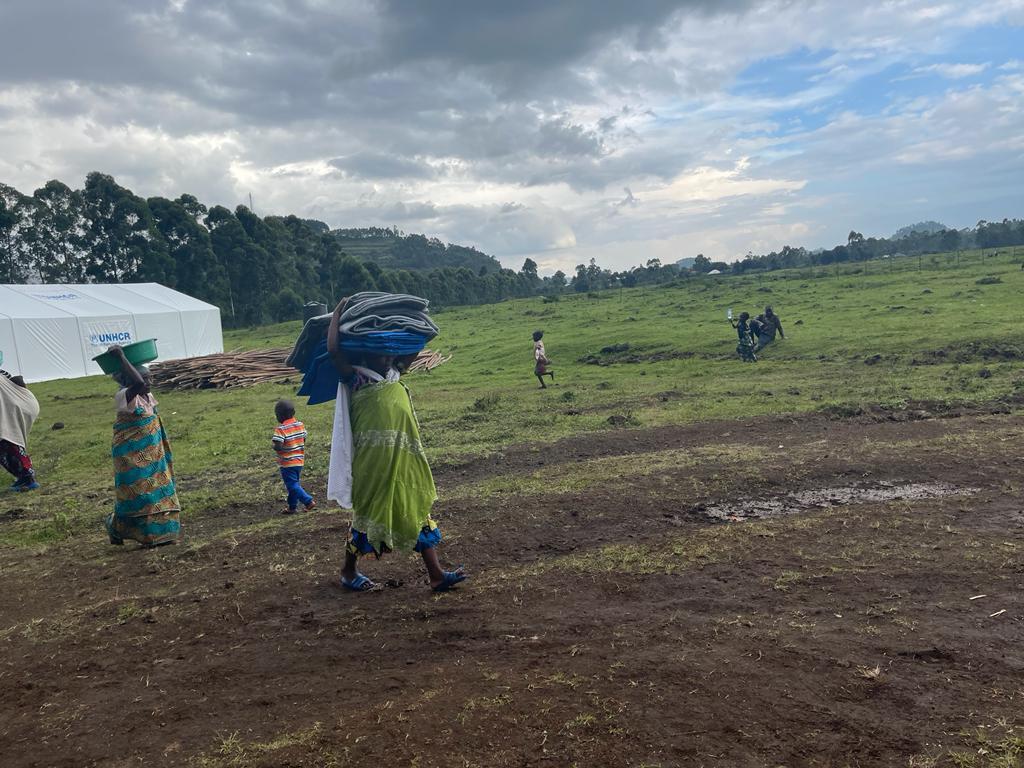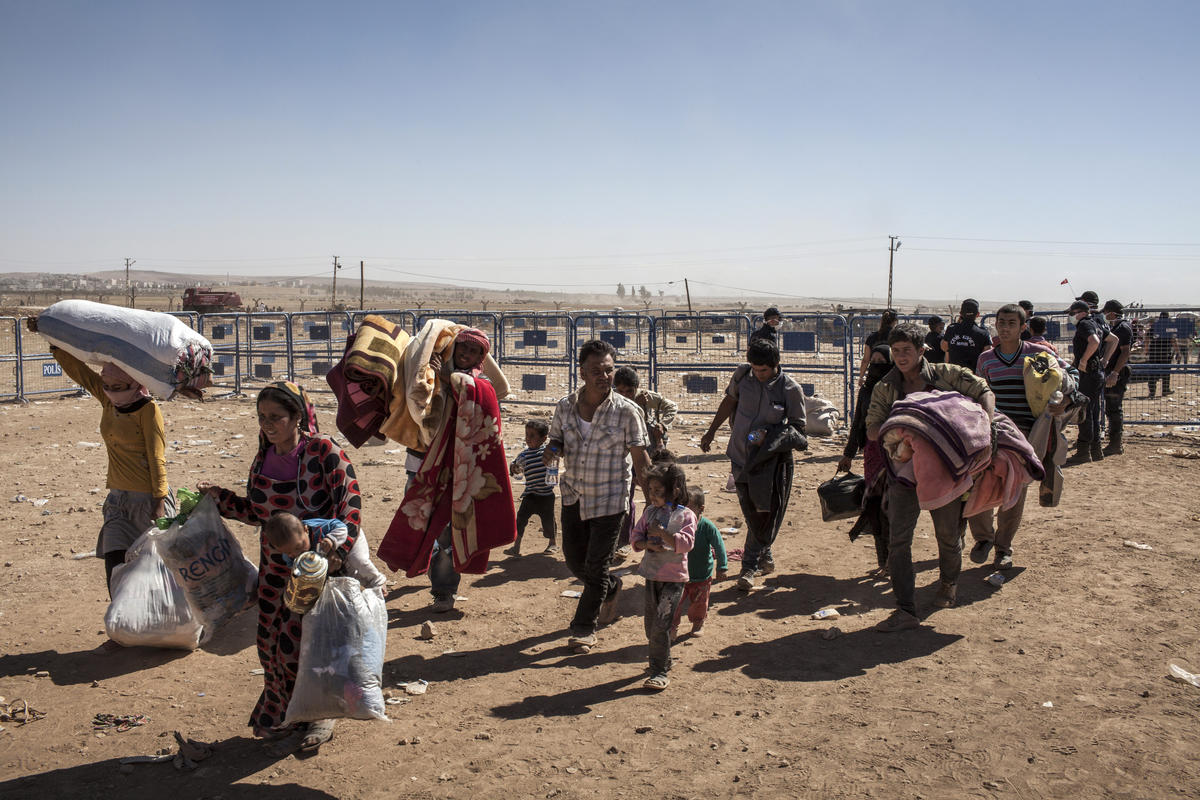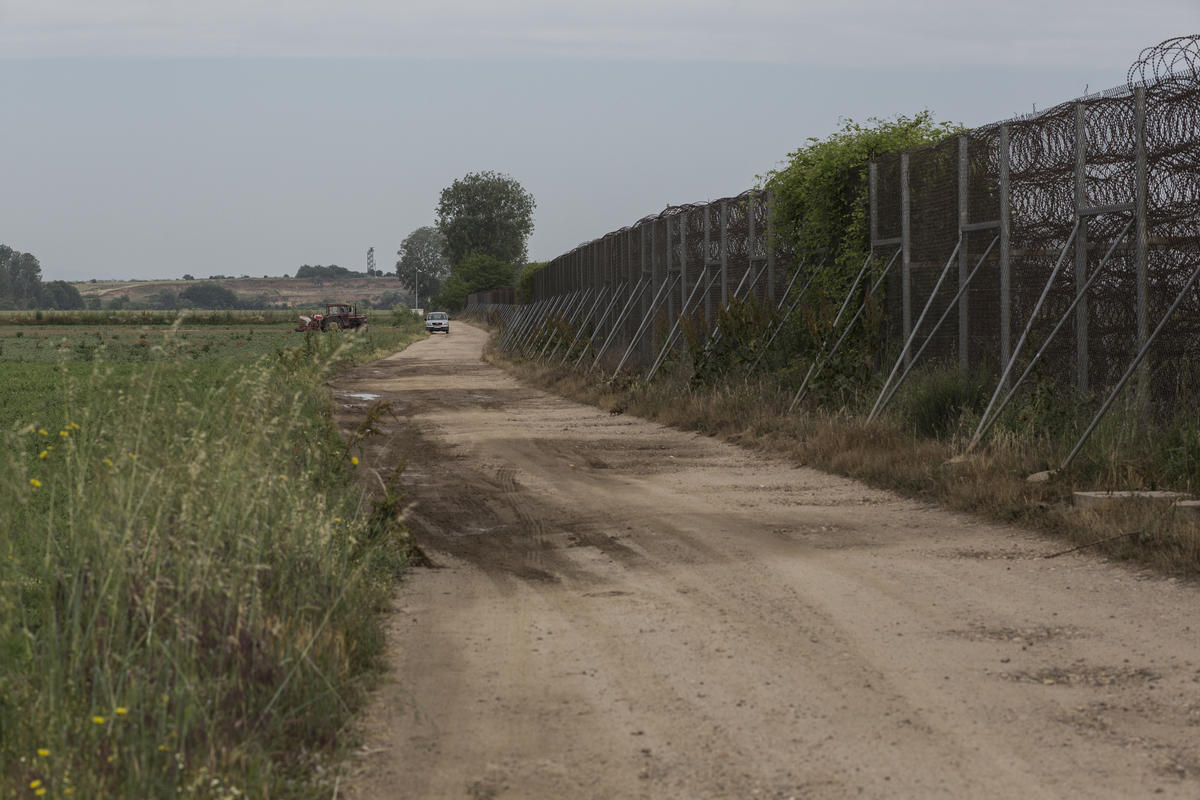Hunger strike reveals strains in Polish asylum system
Hunger strike reveals strains in Polish asylum system

GENEVA, Dec 13 (UNHCR) - WARSAW, Poland, Dec 13 (UNHCR) - A hunger strike in a reception centre for asylum seekers near Warsaw, which has just ended, highlighted the asylum problems facing Poland and other new European Union countries, and emphasised the need for a better system for burden-sharing among EU countries.
For almost two weeks, a group of 200 asylum seekers at Debak reception centre near the Polish capital refused to collect meals from the centre's canteen. "We demand that Poland opens safe passage to Western Europe," wrote the protesters in a petition against their living conditions. "There is no hot water, food is not good, we have no warm clothes, there is no education for our children. Why does Poland accept us if it cannot help us?"
"Taken in isolation, some of the hunger strikers' complaints sounded unrealistic, even trivial and ungrateful - we also heard complaints about insufficient toothbrushes, and the fact that the bed linen isn't changed every day," said Ernest Zienkiewicz, UNHCR's legal officer in Poland. "But they are actually symptoms of a bigger problem, a sign that the system here is overloaded and under-resourced."
The asylum seekers are among the dozens of people - the great majority from Chechnya - who arrive on Poland's borders every day. After filing their asylum claims, the majority apply to stay in a reception centre, where they receive housing, food, basic health care and pocket money while they await the decision on their refugee status. In general, the standards of assistance provided by Poland are perfectly reasonable, but the hunger strike underlined the serious effects the overcrowding and insufficient staffing were having on morale.
Before Poland joined the EU on May 1 this year, most asylum seekers had used it as a transit zone to western Europe. They would apply for asylum upon arrival, then withdraw their applications to seek asylum in other countries. But now that Poland is part of the EU, the Dublin II regulation applies, which means asylum claims can only be filed once.
Since Dublin II does not include any burden-sharing mechanism, there has been a fear that it will result in a disproportionate number of asylum seekers ending up in border states - mostly new EU countries like Poland with relatively inexperienced and thinly-resourced asylum systems. To some extent, those fears are starting to be realised: at the moment, more than 1,000 asylum seekers are now waiting to be sent back to Poland from other EU countries, under the Dublin II rules, with very few slated to be relocated in the other direction.
This influx of asylum seekers - new arrivals and those sent back from other countries - is overwhelming the reception centres in Poland. Debak is among 14 centres for asylum seekers in the country, five of them opened this year. The total capacity of these centres is 2,700, but they now accommodate 2,768, with many more waiting to get in.
Every Monday, crowds of men, women and children gather near the entrance of Debak centre after arriving over the weekend. But the beds are all occupied and there is no space in the other 13 centres.
For those who do make it into the centre, tensions are high from the overcrowding and complaints flow thick and fast - some serious, some not - as soon as someone shows a sign of being prepared to listen.
"I have stomach ache, I get 'nospa'; I have headache, I get 'nospa', whatever I suffer from, I still get 'nospa'. What is this? They only give us painkillers," complained one young Chechen mother, child in her arms and scarf on her head.
"I told the doctor my legs hurt, and he told me I am too heavy," another woman adds. "For me, this is lack of respect."
Several people don't like the food or find it unsuitable for the children.
Others complain about the lack of warm clothes. The centre's management explains that people who need clothes receive money from the European Refugee Fund to buy them. But many asylum seekers use the money for other purposes, and children run around the compound with bare legs and no jacket, gloves or caps.
This affects the children's health, which is another area of concern. Polish law gives asylum seekers access to basic health care in theory, but not always in practice. For many asylum seekers, the "basic health care" is simply not enough. "A growing number of people arrive in Poland seriously sick," said Agnieszka Kopycka, part of the management at Debak centre. "The costs of medical assistance we need to provide are astronomical."
Staffing is one of the biggest problems. This year, the government's Office for Repatriation and Aliens hired 10 staff members for the reception centres. "I could find jobs for 15 more, if only I had the posts," said Jan Wegrzyn, director of the Office. "Right now, there is only one social worker for over 150 people. I am aware this is not enough."
Confused about their legal status and uncertain about their future, the asylum seekers feel frustrated that there seems to be no one who can help them with their problems. Polish non-governmental organisations visit the centres occasionally to offer free legal advice and counselling, but do not come regularly because of time and financial constraints. Likewise, the two psychologists available cannot possibly listen to every asylum seeker and refugee in need.
"The most important demand is not written, it is about how people feel," said Khamzat Aslanbekov, one of the leaders of Chechen community in Poland. "Chechens are a proud people, sensitive about our dignity. We are adults, but are treated like the worse kind of men. People can't stand it. We only want to be treated with respect."
"No one cares what happens to us," said Ayub, a Chechen in his 50s, while the hunger strike was still under way late last week. "We have been protesting for 10 days and no one has asked us what we want or how we feel."
The hunger strike was finally called off on Friday, after the asylum centre management met the asylum seekers to discuss their problems. As part of the agreement to end the strike, the management agreed to introduce improved systems for providing health care, for assigning clothes to those who most need them and providing more suitable food for small children.
"The asylum seekers' demand for safe passage to western Europe was of course unrealistic, and could not be granted, but it reflects the deep frustration of the people, who feel trapped and see no solution to their situation," said UNHCR's Zienkiewicz.
As an asylum country, Poland has seen an increase in its refugee recognition rate this year. As of December 2, there were 7,094 applicants, out of which 2,427 later withdrew their applications. A total of 249 received refugee status and 701 were granted temporary protection, or "tolerated stay", meaning that more than 20 percent of asylum applicants were granted some form of protection.
According to the Office for Repatriation and Aliens, the recognition rate (of refugees and tolerated stay) for Chechen asylum seekers exceeds 80 percent. In this extremely important regard, the Polish system is still performing very well, unlike for example in the Slovak Republic, which is also under strain from a steep increase in the number of Chechens arriving over the past couple of years, but appears to have responded by rejecting almost everybody, Chechens included.
However, life isn't necessarily much easier for those who have officially received protection in Poland, since they then have to move out of the reception centres. Jobs are hard to find in a country with 19 percent unemployment, and scarce affordable accommodation. Nevertheless, there are numerous government and NGO efforts to help them start an independent life. In fact, in some regions in Poland, the government assistance for refugees is not even used up, because of the refugees' deep conviction that they would do better to leave Poland for other EU countries.
"The road to Europe is through Poland," said Hasan, a father of two from Chechnya, who found himself back in Debak centre after being returned from Norway under the Dublin II regulation. "In Poland they ask us why we come here if we don't want to stay. But we have no choice. There is no other road." Nevertheless, taking that road has cost Hasan dearly, as he returned from Norway with nothing, having used up all his resources on illegal travel.
Fellow Chechen Ayub added, "If people could live here, they wouldn't risk their lives crossing the border, swimming through rivers or dying in car accidents trying to reach Austria, Germany or other countries. They leave Poland because they see no other option."
The Office for Repatriation and Aliens' Wegrzyn conceded, "We need EU help - for example to build new reception facilities. Most of all, however, we need an EU approach to Chechen asylum seekers. We all need to think how to find a solution to their situation. Let's face it: Chechens don't want to stay in Poland, and those who are now in Poland feel trapped."
During his visit to Poland in September, UN High Commissioner for Refugees Ruud Lubbers highlighted the need to support the new EU member states in addressing the needs of refugees and asylum seekers who arrive in the EU through Poland or other new border countries. He joined Polish authorities in appealing to the EU for greater burden-sharing.
Today, this appeal is even more justified. With hundreds of people arriving in Poland from the east and west, a prompt solution needs to be found. This solution cannot be found in Poland alone.
* This is the first story in an occasional series on asylum challenges and issues in the new EU member states. Watch this space for more to follow.
By Agnieszka Kosowicz
UNHCR Poland



